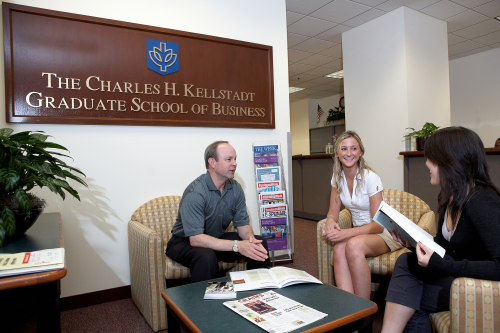Jan 27, 2010
Specialized Master’s Degrees Grow In Popularity Among Business Students Pursuing Focused Career Paths
Specialized Master’s Degrees Grow In Popularity Among Business Students Pursuing Focused Career Paths
When the economy is down and the job market is tough, master of business administration (MBA) program enrollments often go up as working professionals seek to improve their career marketability by pursuing the most well-known of advanced business degrees. But the MBA is not the only choice for students contemplating a return to b-school. Many may find a specialized master’s degree to be a better fit for their career plans.
"As the name indicates, specialized master’s degrees focus on a specific area of business, providing more tailored instruction than an MBA, which provides a broad overview," said Ray Whittington, dean of DePaul University’s Kellstadt Graduate School of Business, which offers 10 specialized master’s degrees, the widest selections of such degrees in the competitive Chicago MBA market. "These degrees are ideal for students who have defined career paths and want to enhance and expand their expertise. They also are an attractive option for students who have just earned their undergraduate degrees and want to continue their educations immediately. Unlike many MBA programs that require a few years of work before enrollment, students can enter a specialized business master’s degree program right away."
Kellstadt’s specialized offerings include a master of accountancy degree as well as master of science degrees in the following disciplines: accountancy; computational finance; e-business; economics and policy analysis; finance; human resources; marketing analysis; real estate; and taxation.
Several of these programs have experienced enrollment increases this academic year, including the master of science in accountancy program, which saw enrollment jump about 32 percent from last fall.
Depending on the degree, students are required to take between 12 and 15 courses focused on their specialty. About a third of the classes are electives. A typical MBA program requires at least 18 courses to complete.
After researching business degree options across the country, Daniel Dence entered DePaul’s M.S. in taxation program this fall fresh from Ohio State University, where he earned a bachelor’s degree in accounting and finance last June.
"I knew I made the right decision to study accounting in college, but accounting is a very broad subject," he said. "After a few tax classes and volunteering as a tax return preparer, I knew a career in tax fit me." The program gives Dence a chance to study tax in-depth, he said, and to "make a more informed decision when choosing what type of tax work I want to pursue in a full-time job."
Dence said other reasons he chose DePaul included the large number of seasoned practitioners on Kellstadt’s School of Accoutancy faculty, the flexibility to enroll in courses at night, and the school’s downtown Chicago location, "which provides an environment conducive to exploring the real-world business district and a variety of potential employers."
"The best part about the M.S. in taxation is that you surround yourself with a group of people with the same interests and goals as you," he added.
In contrast to Dence, Erin Flanagan entered DePaul’s master in accountancy program with 16 years of work experience. Currently an accountant with RSM McGladrey Inc., Flanagan is pursuing the degree because it is an expected prerequisite for advancement in her career. "If your career is in a specialized area and there is a specific degree, I think it is more beneficial because you are learning the information needed for your specialized career."
Kathleen Wheeler, who earned her master’s in taxation (MST) degree from DePaul in 2006, agrees. "Completing DePaul’s MST program was one of my best professional and personal accomplishments," said Wheeler, director of income tax at the brand marketing firm Schawk Inc. "I wanted to maximize my opportunities within the field of taxation. Many of my mentors earned their MSTs from DePaul, and they always spoke very positively of their experiences. DePaul has an excellent reputation, and the MST program ranks among the best in the country.
"The MST provides an expertise in taxation and enhances your marketability as a tax professional," she continued. "The robust curriculum builds strong technical skills and encourages students to think critically about new tax issues. My skill set was enriched through the program, and I have made valuable contributions to the tax community because of my experience at DePaul."
Wheeler’s advice to students considering specialized business master’s degrees: "Students should choose a master’s program that fits their passion. Returning to school is a big time and financial investment, and students should make the most of it. Having time to learn and study new subjects related to your career is a wonderful and rare opportunity."
For more information about Kellstadt’s specialized master’s degrees, call (312) 362-8810, e-mail kgsb@depaul.edu or visit: kellstadt.depaul.edu/Programs/SpecializedMasterDegree/index.asp
About DePaul’s College of Commerce
Founded in Chicago in 1913, the College of Commerce is one of the nation’s 10 oldest business schools. Encompassing an undergraduate program and the Kellstadt Graduate School of Business, the college offers respected, practical, accredited programs of business study. A diverse blend of leading scholars and distinguished business professionals teach the college’s 4,500 undergraduate and 2,300 graduate students. The college’s part-time MBA program is ranked in the top 10 by U.S.News & World Report, the undergraduate program is ranked in the top 100 by BusinessWeek, and the graduate and undergraduate entrepreneur programs are rated in the top 10 by Entrepreneur magazine.

DePaul's Kellstadt Graduate School of Business offers prospective students a wide array of specialized master's degrees as well as a highly ranked MBA program.
